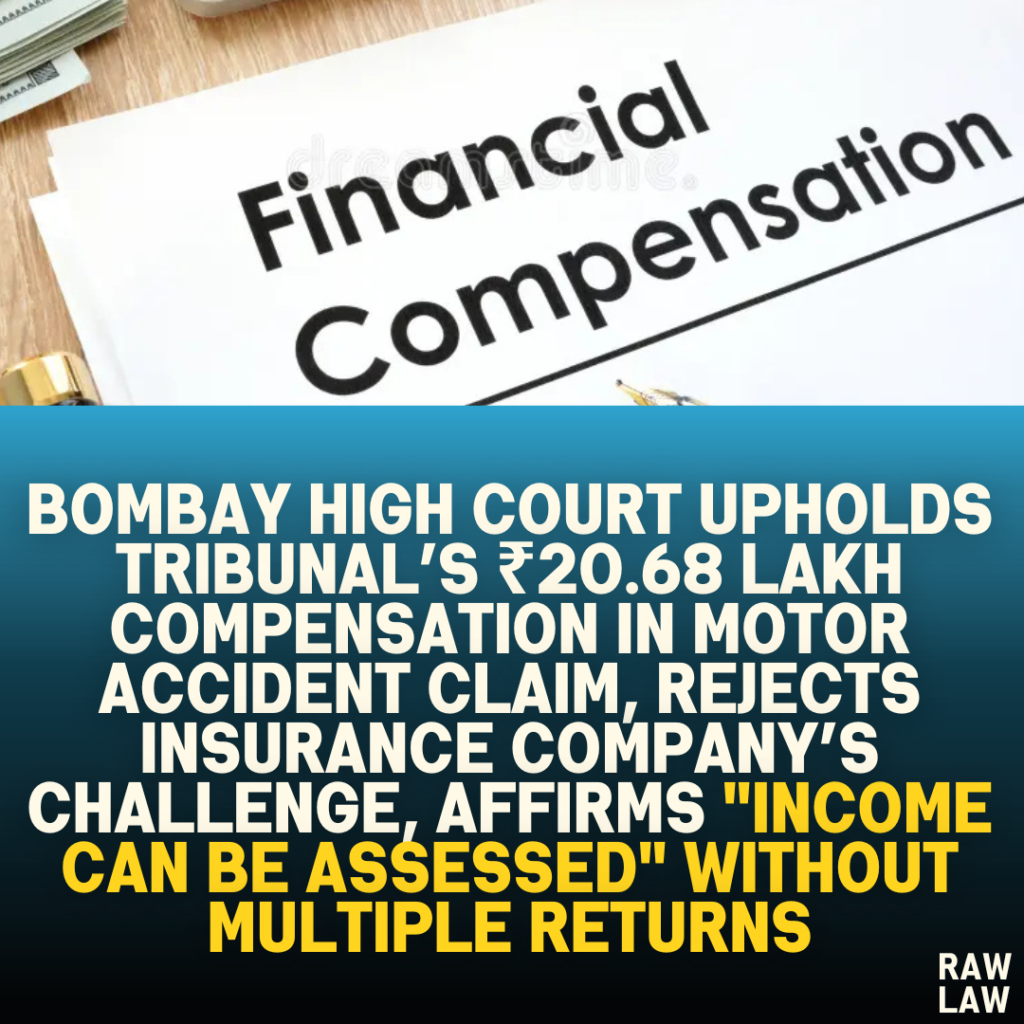Court’s Decision
The Bombay High Court dismissed the appeal filed by the insurance company challenging the compensation awarded by the Tribunal to the deceased’s family. The court upheld the Tribunal’s assessment of the deceased’s annual income at ₹1,15,640 based on available records, concluding that the calculation of compensation was accurate and appropriately applied.
Facts
The deceased, who was employed as a cashier and supervisor, earning a combined monthly income from both positions, died in a vehicular accident on October 16, 2010. He was a pillion rider on a motorcycle when a tanker collided with them, resulting in fatal injuries. An FIR was filed against the tanker driver under IPC Section 279, 304-A, and Section 184 of the Motor Vehicle Act. The claimants included the deceased’s parents and two minor siblings.
Issues
- Whether the Tribunal’s assessment of the deceased’s annual income was justified, given the evidence provided.
- Whether the compensation awarded by the Tribunal required adjustments, particularly regarding dependency and future prospects.
Petitioner’s Arguments
The petitioner, representing the insurance company, contended:
- That only one income tax return for the 2009-10 fiscal year was presented, suggesting it was insufficient to determine the deceased’s average income accurately.
- That the Tribunal should have required income tax returns for multiple years to reflect any potential income increase.
Respondent’s Arguments
Counsel for the claimants argued:
- That an income tax return for even a single year is an adequate public document for determining income.
- That the Tribunal had rightly based its judgment on the available income records, with no further substantiation required.
Analysis of the Law
The court observed that income tax returns, as public records, provide a legitimate basis for income assessment. The court held that even in the absence of multiple years’ returns, the Tribunal had sufficient grounds to estimate the deceased’s income based on the single available return.
Precedent Analysis
The court referred to precedents allowing income assessments on the basis of limited records, affirming the approach of estimating income based on reliable single-year data when broader financial records are unavailable.
Court’s Reasoning
The court reasoned that the Tribunal had exercised due diligence in determining the deceased’s income and calculating compensation. Key aspects, such as future prospects (50%), dependency (2/3rd), and applicable multipliers based on the deceased’s age (24 years), were accurately factored. The court noted, “Merely because multiple returns were not provided does not mean the income cannot be assessed,” upholding the Tribunal’s decision.
Conclusion
The appeal was dismissed, with the High Court endorsing the Tribunal’s award of ₹20,68,720 solely to the parents. The court confirmed that siblings were rightly excluded from compensation. The security deposit was ordered to be transferred for disbursal by the Tribunal.
Implications
This judgment reinforces that income estimation based on single-year returns can suffice in motor accident compensation claims, particularly where further documentation is unavailable. It also affirms the Tribunal’s discretion in calculating compensation while applying recognized dependency, multiplier, and future prospect standards.




Pingback: Delhi High Court Allows Filing of New Evidence Despite Delay, Emphasizes Expedited Hearing on Injunction Application in Unauthorized Lift Construction Dispute" - Raw Law